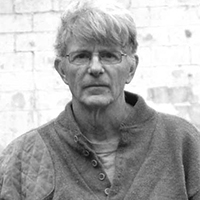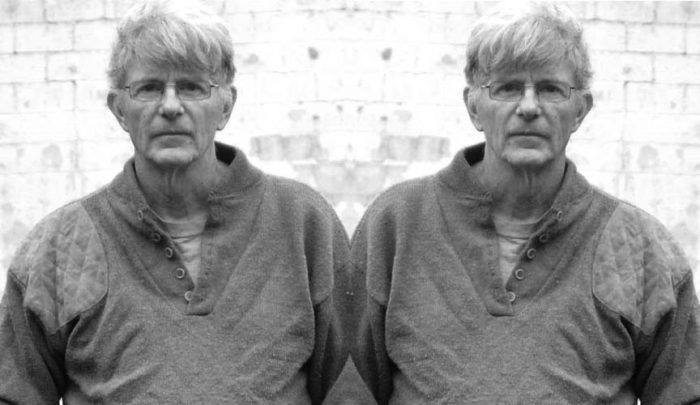Lost Time
by Edd Jennings
July 22nd, Wednesday, Sun at 75 degrees in the northeastern quadrant—I lost my watch, or maybe—I hope—I misplaced it somewhere in my gear as I packed up to leave camp. The little Timex was already on its last legs. The plastic band had broken, and I had it attached to my wrist with parachute cord. The watch’s calendar showed a day behind because it always shows a thirty-one day month, and I couldn’t reset it correctly for the beginning of July because the adjustment knob had broken off. Without the watch, I feel naked because I cannot at a glance reduce my world to a number.
It is early morning and calm. Beyond that what can I say about my place in time and the world? My latitude lies just above sixty degrees forty-five minutes. The sun stands at seventy-five degrees by my compass reading, and I haven’t figured out how to use the crude clinometer on the compass to get the angle of elevation of the sun above the horizon. To measure the sun’s elevation with any accuracy would mean looking directly at the sun.
I use the watch for pacing. If I hurt after four or five hours of paddling, I have the tendency to take a breather and continue. If I feel good after twelve hours, my tendency is to quit. Many athletes recommend that you listen to your body, a cute enough expression, but only the simple-minded fail to realize that the body lies.
Sun 87 degrees—If the sun is at 87 degrees, and my shadow falls directly in line with the canoe’s bow, I must paddle on a line, which amounts to approximately due west. I hadn’t attempted to use the sun or its shadows for much of anything in the past. The sun and its shadows are one of the few navigational tools an ancient wanderer would have known. By rarely using the sun, when I do use it, I do it with uncertainty and clumsiness. I always wonder if I miss the useful and the obvious or whether my dissatisfaction with generalities causes me to look for specifics impossible to determine with the means at hand. I don’t want “about west.” I want the 273-degree reading of a graduated dial.
My compass readings lack refinement. The 87-degree reading I use for the position of the sun comes off a spruce that seems to stand directly below the sun, but no matter how big the rose on this Suunto Compass or how accurate, I don’t use the compass with a level. To further introduce inaccuracies, I read the compass from the unstable platform of a canoe shifting in the breeze.
Sun 103 degrees—I have my system. The sun makes one, or rather the earth—I almost went back to Ptolemy—does one revolution in about twenty-four hours, or moves about 1/24th or fifteen degrees of the full 360 degree circle each hour. I can easily get enough readings for sunrise and sunset, which will change only slightly each day, to calculate the remaining daylight by comparing those readings against the sun’s apparent fifteen degree per hour movement across the sky. Time elapsed doesn’t seem like an hour since my last entry. Whether it is or isn’t, I will soon be accustomed to the difference and begin to take more accurate readings more quickly.
Sun 112 degrees—It occurred to me that perhaps a back reading using the compass lanyard to make a shadow across the rose might have more accuracy on much the principle of the backstaff replacing the quarterstaff. I have entered a world of altered values. At home, this red nylon lanyard attached to my compass could sit in a drawer for years, an unremarked item of clutter, as superfluous as the ivory billiard ball or the sewing kit that might not have been examined or moved since the Second World War. If someone in the next generation living in the old house after my time fished the compass out of the clutter of the drawer, he might speculate that the compass would fit into the pocket more neatly without the lanyard. The person looking into that cluttered drawer sometime in the future would never guess the importance this simple piece of red nylon string had in my life and fortunes, as I fail to appreciate the small items left over from the generations before. Life is lost, and holding the small item in my hand and wondering what it could have meant will never quite bring it back.
I can’t make the islands I see in front of me match the map, but where else but this outlet bay could I have traveled for so many hours toward the north? Wishful dangerously wrong reasoning.
Sun 118 degrees—I have made the map fit my position. Even a back reading, which is easier, subjects itself to wide variation. The compass requires a dead level surface and the string held exactly perpendicular. Suunto rates their compass as accurate to within two degrees. If I had a solid surface, and a pair of levels, I see no reason why it wouldn’t hold to such a standard.
Sun 128 degrees—A haze in front of the sun made a back reading impossible. Doubt checks my speed. It must have been the same for the early hunters moving into this country. To learn this country must have been the work of generations, as a man in his prime hunted a bit farther afield than his father.
Moments later—Perhaps I should give stage directions rather than continual readings. I will try. The decrepit man’s legs hurt. He is perhaps lost, but only moderately concerned. He proceeds through his country with an eye for anything he might use. Were he to use his compass mirror for self-examination, he would discover that he had let himself go. His attention to grooming has dropped far below the level of the civilized man, who is aware that he may be seen at any time. Our man, if he itches, scratches.
I like this. After all how different am I from a character in a novel? I have the power to create myself as I wish, don’t I?
Fewer minutes later—To a degree I create myself. I can be physically strong or not based upon the amount of work I do. I won’t, though, run the four-minute mile. I can be intelligent or not, as I choose to read, but I am past being hailed as the new prodigy. The genetics of my makeup limit. Chance also is an element. Lesser men have done more, better men less.
The vast majority of humanity is a combination of no more than the effects of genetics and crass chance. There are those few, however, who fight, and every skirmish is not lost. It is a man’s job to fight the unequal fight.
Sun 166 degrees—I pulled up on the bank to make bannock and tea. I am lost. When I hit this big open stretch, I knew I couldn’t be where I thought I was. Blue goes into blue in the southwestern quadrant, where sky touches lake. Nothing in the area of the outlet matches that scenario.
I spent some time, when I first stopped here, with the map and compass. I only made things worse until I decided to build a fire and have tea.
My first order of business demanded that I deal with my anxiety. I had to ask myself if I expected to do this trip without mistakes, and now that I had made a mistake, how serious was it? My answer had to include the two basics: I had not hurt myself, and I had not lost any gear, which meant I had the means to deal with the problem.
Sun 240 degrees—I finally made a place on the map fit. It lies on the north shore of Wholdaia on the main shore north of a chain of islands just west of the 104th meridian, and on the eastern edge of map 75A. I thought I had moved much farther east. I don’t have and may never have a reasonable explanation of how I arrived here. I may have lost a full day of paddling. I don’t care. I just wanted the anxiety to be over. Before I matched this place with the map, I had to fight the impulse to just follow my instinct and move. Had I allowed my instinct reign, I would have moved in exactly the wrong direction.
Loaded and paddling east—I could have stayed where I stopped to make tea and bannock, according to the sun, I have been out ten to eleven hours since I left camp this morning, but to stay at that campsite would have made for a very bad night. The place had natural beauty and an easy place to load and unload a canoe, but it was as if the place had been trashed, although that’s not exactly it. At the sight of somebody’s liter, I could have felt righteous indignation, not a completely unpleasant emotion. In that place, I fought the worst of myself and came near to losing. All afternoon, I had the impulse to load up and go, and figure within hours I would be in the Dubawnt River’s current. I wouldn’t have been. I would have paddled in the wrong direction. The memory of the rising panic tainted everything about this otherwise beautiful and untouched place.
Sun 268 degrees, Camp XLVI—I will accept the setbacks of the day with the best grace I can manage. If the season depended upon the success or failure of a single day, I wouldn’t have a chance.
Thinking about today’s solar observations makes me realize just how little I know of the actual mathematics of the universe. Though I know some of the history of science from the Greeks to Copernicus, Kepler, and Newton, and up to the moderns, I couldn’t personally produce the mathematics to refute Ptolemy. As far as having knowledge of the visible motions of the heavens, and how these motions relate to the day, the month, and the seasons, I know less than the ancients. I don’t usually concern myself with the movements of the sun. I use a watch. I don’t usually track the phases of the moon. I use a calendar. I don’t watch for the rise of the Pleiades in the east, or the setting of Orion in the west. These things the ancient mariners knew, and lived by, feel strange and clumsy to me. I have gained from my instruments, but in so gaining sometimes I feel as if I have become less man.
BIO
 Edd B. Jennings runs beef cattle on the banks of the New River in the mountains of Virginia. Since spring of 2016, he has placed work with Trigger Warnings, The Scarlet Leaf Review, Flash Fiction Magazine, Jotters United, Bedford 87, Thread Magazine, Quail Bell, Roane Publishing, Sicklit, Ginosko Literary Journal, Tell us a Story, Sleet, The Blotter, REAL magazine, Literary Orphans, and Quarterday. His nonfiction Arctic canoeing books and his novel, Under Poplar Camp Mountain, are with the Leslie E. Owen Agency.
Edd B. Jennings runs beef cattle on the banks of the New River in the mountains of Virginia. Since spring of 2016, he has placed work with Trigger Warnings, The Scarlet Leaf Review, Flash Fiction Magazine, Jotters United, Bedford 87, Thread Magazine, Quail Bell, Roane Publishing, Sicklit, Ginosko Literary Journal, Tell us a Story, Sleet, The Blotter, REAL magazine, Literary Orphans, and Quarterday. His nonfiction Arctic canoeing books and his novel, Under Poplar Camp Mountain, are with the Leslie E. Owen Agency.


















